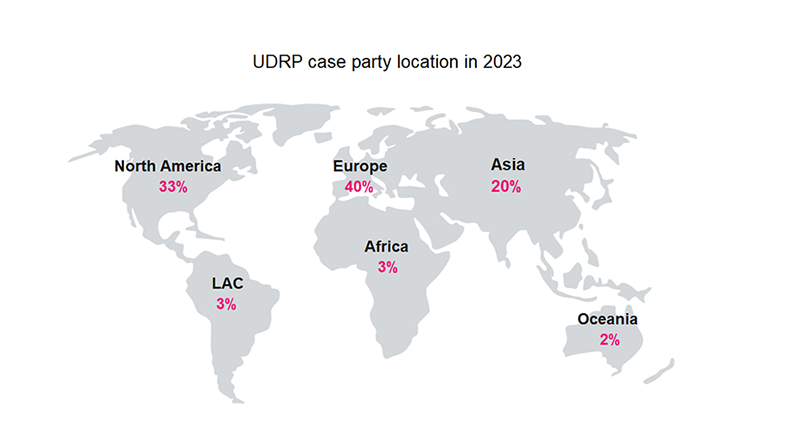Record-breaking number of domain name disputes in 2023: A sign of the times?
- Domains
- IP & Trademarks

The World Intellectual Property Organization (WIPO) experienced a notable surge in domain name dispute filings in 2023, setting a new record with almost 6,200 cases.
In a recent article published by WIPO, they highlighted another record year in domain name dispute filings marking an impressive 7% increase from the previous year and a substantial 68% rise since the onset of the COVID-19 pandemic. This surge reflects the global shift towards digital commerce and virtual transactions as our online buying habits continue to thrive.

Global trade mark owners filed a record-breaking 6,192 cases in 2023 under the Uniform Domain Name Dispute Resolution Policy (UDRP) and various national adaptations, with leading filing countries being the United States, France, and the United Kingdom.
Cybersecurity challenges push the increase in disputes
However, this exponential growth in internet activity has not been without its challenges. Cybercrime has paralleled the rise of online transactions, underscoring the need for robust cybersecurity measures. Recent statistics indicate a significant uptick in cybercrime incidents, highlighting the urgency of addressing illicit activities in the digital space. Against this backdrop, the WIPO-designed UDRP remains a critical tool for brand owners navigating the complex landscape of online abuse.
This upsurge contributed to a cumulative total of 67,625 cybersquatting cases handled by WIPO since the inception of the UDRP, highlighting a consistent decade-long growth trend. Factors influencing this escalation include the overall expansion of domain name registrations, increased awareness of the UDRP across diverse company sizes, and the evolving landscape of cybersquatting activities. In recent years, cases involved not only traditional “cybersquatting” but increasingly were used to tackle fraud, malware and phishing attacks using domain names, as well as counterfeits, and unlicensed pharmaceuticals scenarios.
Transfers remain the prominent outcome of disputes
The UDRP continues to be an appealing alternative to navigating jurisdictional complexities through court cases with positive results. Transfers remain the dominant outcome with 82% of cases ending with the domain name being handed over to the rightful owner. 14% of parties settled their cases, which means in those cases that the filing party receives a $1,000 refund, and the remaining 4% were either cancelled or complaint denied.
What is Cybersquatting? Cybersquatting refers to the act of registering or using a domain name to profit from a trade mark, corporate name, or personal name of an individual.
Diverse domain landscape
The majority of cases involved the well-known ".com" domain, representing 80% of WIPO cases. However, there was a notable increase in filings for country code Top-Level Domains (ccTLDs) such as .AI (Anguilla), .AU (Australia), .CN (China), .EU (European Union), .MA (Morocco), and .MX (Mexico). In 2023, WIPO expanded its coverage to include cases for the .GA (Gabon) and .MG (Madagascar) ccTLDs.
Procedures were conducted in 17 languages, with English, Chinese, French, Spanish, Russian, Japanese, Turkish, German, Portuguese, and Swedish being the most frequently used. The diverse range of industries involved in these cases covered sectors like banking and finance, biotechnology and pharmaceuticals, fashion, and retail.
A continued commitment to brand protection
As witnessed by WIPO, the domain name dispute landscape reflects a dynamic and challenging environment. The record-breaking surge in UDRP filings, coupled with a substantial increase in cybersquatting cases, underscores the critical role of effective mechanisms like the UDRP in protecting the online presence of brand owners. As a brand protection company with extensive experience and success in filing UDRPs for our clients, these statistics do not come as a surprise. Our role in safeguarding the online presence of our clients in 2023 was crucial in navigating this surge in cases and addressing a broad spectrum of issues. From unauthorised use of trade marks in domain names to addressing opportunistic bad faith and the growing trend of fraud and phishing attempts.
Images
Ales Nesetril from Unsplash
WIPO
Explore our online brand protection further
Abion has a 99% UDRP success rate. Contact us for consultation today!


